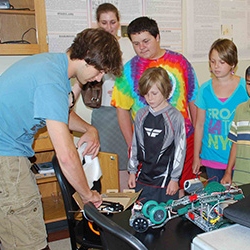A Fruitful Discovery: Why We Age
In recent years, fruits like the acai berry and pomegranate (coined ‘superfruits’) have been wildly heralded for their numerous health benefits. But what role do such fruits actually play in increasing the human lifespan? Groundbreaking research is being conducted by biological sciences professor Dr. Yuqing Dong, microbiology and molecular medicine professor Dr. Min Cao, and their Creative Inquiry team. They are helping determine whether various natural extracts affect the body’s aging and how they do so. In the process, the group has come upon some startling evidence that points to a link between stress resistance and lifespan.
The team first began its studies on a fruit regarded by many as one of the healthiest, the cranberry. This berry is known to protect the body from oxidative stress; that is, the generation of compounds created through our metabolism that are hazardous to our DNA and protein molecules. Could cranberry extract also have anti-aging implications? The team investigates how this and other high potential natural extracts could have life extending effects. Along with the cranberry, the Creative Inquiry team is looking at noni, a Hawaiian fruit that contains even more antioxidants than cranberries, and royal bee jelly, a substance fabled for its anti-aging effects.
Although the research team’s goal is human application, for now Dr. Dong and his students are studying Caenorhabditis elegans or the nematode worm. The short lifespan of the nematode, only two to three weeks, makes it the ideal organism for aging studies. The worm’s genome may only be 40 percent similar to the human genome, but 60-70 percent of its genes are expressed the same as in humans, making it an applicable model for most situations. For example, even Alzheimer’s disease has been studied in the nematode worm.
Nematodes obtain the nutrients of the extracts in a way any other worm would: they simply eat them! One of the three natural extracts is incorporated into the nutrient-rich substance that the nematodes live. The worms then consume this extract-ingrained media for six days, from hatchling to young adult. The researchers record their overall lifespan and compare differences.
Break out the turkey and cranberry sauce because the results are promising. The cranberry extract increased the average worm lifespan by about 40 percent and royal jelly increased lifespan by roughly 25 percent. The noni fruit extract study remains incomplete, although it seems to have similar effects.
Perhaps the most astonishing part of the results is that the increase in longevity was correlated with an augmented ability to resist a stressor. The cranberry extract not only increased lifespan, but it increased heat shock resistance as well. The worm normally lives at 25°C, but if exposed to temperatures 35°C or more, its heat shock resistance mechanism kicks in. This protection comes from proteins that help the body adjust to the consequences of high temperatures. Normally, nematodes can only live a half-hour in such warm conditions, but after being treated with cranberry extract, the nematodes could stand the heat for nearly twice that time. Initial results suggest that the natural extracts are also involved in the protection from various stressors, such as UV radiation and extreme cold, indicating that the secret to a long life may be due to a strong defense against stressors.
In 2012, the project has expanded its horizons. Dr. Dong puts it, “Humans do not follow the same habits throughout their whole lives. Young people don’t care what they eat, but when they get older, they start consuming healthy foods. We want to see if we can replicate that in our experiment.” The team is analyzing the effect the extracts have when given to the nematodes at different points of their lives. “Does it increase their lifespan more when the extract is given to them the last week of their lives or the first week?” This new part of the study aims to identify at what point in life such extracts have the strongest effect.
Along the way, the team is discovering new things about these special extracts. Cranberry extract not only has anti-aging implications, but the Creative Inquiry team has shown that it also has anti-microbial properties. It appears to slow the growth of some pathogens, such as salmonella.
It is not clear if all ‘superfruit’ or antioxidant-rich foods augment longevity, but Dr. Yuqing Dong and his Creative Inquiry team have provided substantial evidence demonstrating that at least some increase lifespan by supporting stress resistance. Who needs one of those expensive wrinkle-fighting creams when you can drink a glass of ice-cold cranberry juice?



